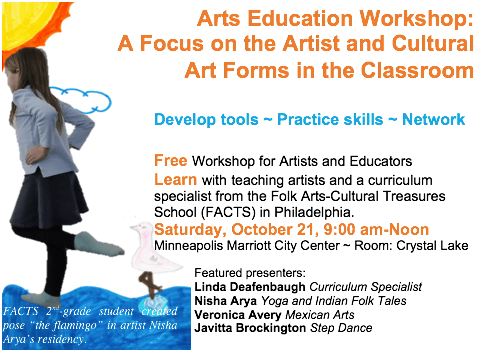Minnesota artists, educators, and attendees of the the American Folklore Society meeting are invited to a hands-on professional development opportunity to deepen artists’ teaching strategies on Saturday, October 21, 2017. Participants will focus on the relationship of learning goals, instruction, skills building, and assessment. Folklife Education Specialist Linda Deafenbaugh and three artists of the Folk Arts-Cultural Treasures School (FACTS) in Philadelphia, awarded the Blue Ribbon School designation in 2016, will lead instruction.
Develop tools ~ Practice skills ~ Network
Free Workshop for Artists and Educators
Learn with teaching artists and a curriculum specialist from the Folk Arts-Cultural Treasures School (FACTS) in Philadelphia.
Saturday, October 21, 9:00 am-Noon
Minneapolis Marriott City Center ~ Room: Crystal Lake
Featured presenters:
Linda Deafenbaugh Curriculum Specialist
Nisha Arya Yoga and Indian Folk Tales
Veronica Avery Mexican Arts
Javitta Brockington Step Dance
Audience: Folk artists, artists, and folklorists working with artists in education and educational settings
Workshop objective:
Participants will gain skills needed to plan an excellent folk arts learning experience.
Goals to meet this objective:
1. Participants will learn from a Curriculum Specialist how artists can make use of the Planning Triangle: goal – assessment – instruction. It looks simple, but even after training artists on this for years we discover the complexity of balancing all sides. A good educator is intentional and reflective. Teaching Artists will lead activities for all participants to deepen their exposure and have take-away planning materials.
2. Participants will explore the big ideas of cultural processes. Diversity and inclusion is a timely topic for many educators. In folklife education, we want students to explore the rich nuances of a culturally situated art form through experiential learning. Why? To develop better understanding of those who are culturally different, and to engage in self-reflection in order to better understand self. Instruction without intentionality toward achieving this goal will just as easily teach new stereotypes. Folklife education uses a me-to-we approach of exploring self before exploring others. What does this approach mean for artists who bring cultural arts into the classroom?
3. Artists and Educators will learn about the skills of folklife education. Folklife education teaches students inquiry skills to equip them to be skillful explorers of their own and others cultures. These are the skills of ethnography. The teaching artists will walk participants through examples from their own residencies to demonstrate the skills of inquiry, observation, and meaning making.
4. Artists will examine what arts integration means when partnering with teachers. Teachers have their own set of goals, knowledge, and skills they must develop in a unit. Building upon the goals above, participants will explore how folk arts residencies can accomplish what educators must do in the classroom, but through the particulars of one culture’s folk art form. Topics such as co-teaching, goal-setting, and assessment will be addressed.
Sponsored by Local Learning and The American Folklore Society Education Section. Funding from the National Endowment for the Arts supports the work of Local Learning.

